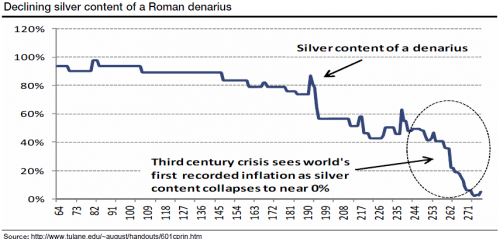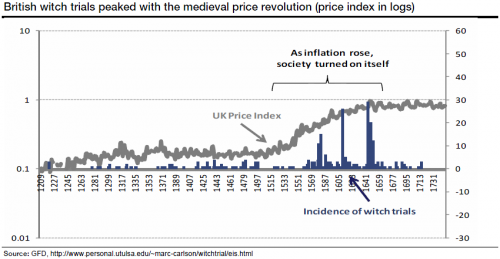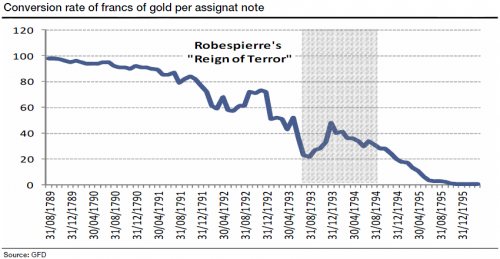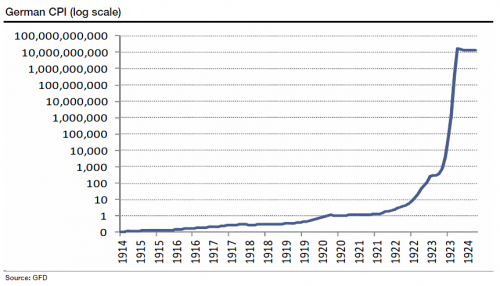From Currency Debasement To Social Collapse: 4 Case Studies
Submitted by Tyler Durden Zero Hedge on 10/02/2012
At its most fundamental level, SocGen's Dylan Grice notes that economic activity is no more than an exchange between strangers. It depends, therefore, on a degree of trust between strangers. Since money is the agent of exchange, it is the agent of trust. Debasing money therefore debases trust. Grice emphasizes that history is replete with Great Disorders in which social cohesion has been undermined by currency debasements. The multi-decade credit inflation can now be seen to have had similarly corrosive effects. Yet central banks continue down the same route. The writing is on the wall. Further debasement of money will cause further debasement of society. Dylan, like us, fears a Great Disorder.
Selected extracts from Dylan Grice
If the authorities raise taxes explicitly and openly, voters know exactly why they have less spending power. They also know how much less spending power they have. But if the authorities instead raise money by simply printing it, they raise the revenue by stealth. No one knows upon whom the burden falls.People notice only that they can't afford the things they used to be able to afford, or they can't afford the things which everyone else can afford. They know that something is wrong, but they just don't know what, why, or who is to blame. So inevitably they look for someone to blame.
So it is with monetary debasement, as Keynes understood deeply (so deeply, in fact, that it?s ironic so many of today's crude Keynesians support QE so enthusiastically). In 1921 he said:
“By a continuing process of inflation, Governments can confiscate, secretly and unobserved, an important part of the wealth of their citizens. By this method they not only confiscate, but they confiscate arbitrarily; and, while the process impoverishes many, it actually enriches some …. Those to whom the system brings windfalls …. become “profiteers” who are the object of the hatred … the process of wealth-getting degenerates into a gamble and a lottery .. Lenin was certainly right. There is no subtler, no surer means of overturning the existing basis of society than to debauch the currency. The process engages all the hidden forces of economic law on the side of destruction, and does it in a manner which not one man in a million is able to diagnose.”
History is replete with Great Disorders in which currency debasement has coincided with social infighting and scapegoating. This debasement of currency also coincided with a debasement of society. Factions grew more suspicious of one another. Communities fragmented. And one part of the community bore the brunt of the fears.
Third Century Roman inflation (and implicit currency debasement) sparked a rapid turnover of emperors as the scapegoating over the systemic debasement saw Romans turned on Christians with a great violence which lasted throughout the period of the currency debasement but peaked with Diocletian's edict of 303 AD. The edict decreed, among other things, that Christian meeting places be destroyed, Christians holding office be stripped of that office, Christian freedmen be made slaves once more and all scriptures be destroyed. Diocletian's earlier edict, of 301 AD, sought to regulate prices and set out punishments for 'profiteers' whose prices deviated from those set out in the edict.
A similar dynamic seems evident during Europe's medieval inflations, only now, the confused and vain effort to make sense of the enveloping turmoil saw the blame focus on suspected witches. The following chart shows the UK price index over the period with the incidence of witchcraft trials. Note the peak in trials coinciding with the peak of the price revolution.
Were the same dynamics at work during the French Revolution of 1789? The narrative of Madame Guillotine and her bloody role is well known. However, the execution of royalty by the Paris Commune didn't begin until 1792, and the Reign of Terror in which Robespierre's Orwellian sounding 'Committee of Public Safety' slaughtered 17,000 nobles and counterrevolutionaries didn't start until well into 1793. In the words of guillotined revolutionary Georges Danton, this is when the French revolution 'ate itself'. But the coincidence of these events to the monetary debasement is striking. The political violence was justified in part by blaming nobles and counter-revolutionaries for galloping inflation in food prices.
However, the most tragic of all the inflations in my opinion, and certainly the starkest example of a society turning on itself was the German hyperinflation.
Like other Axis countries on the wrong side of the War and now in the grip of hyperinflation,Germany turned viciously on its Jews.
It blamed them for the surrounding evil as Romans had blamed Christians, medieval Europeans had suspected witches, and French revolutionaries had blamed the nobility during previous inflations.
So I keep wondering to myself, do our money-printing central banks and their cheerleaders understand the full consequences of the monetary debasement they continue to engineer? Inflation of the CPI might be a consequence both seen and measurable. A broad inflation of asset prices might be a consequence seen, though not measurable. But what about the consequences that are unseen but unmeasurable - and are all the more destructive for it? I feel queasy about the enthusiasm with which our wise economists play games with something about which we have such a poor understanding.
And now the social debasement is clear for all to see. The 99% blame the 1%; the 1% blame the 47%; the private sector blames the public sector, the public sector returns the sentiment - the young blame the old, everyone blame the rich - yet few question the ideas behind government or central bank...
And the central banks are ultimately controlled by the vatican...



